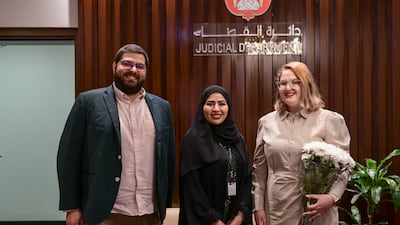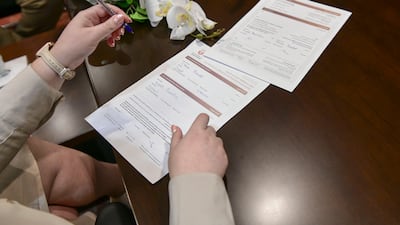Read: the new law's main provisions explained
The UAE has announced new laws for non-Muslim expatriates covering key family matters such as marriage, divorce, inheritance and child custody.
The federal-decree law on personal status will come into effect nationwide on February 1, 2023.
The new legislation will set down procedures for formalising marriage contracts before courts and finalising divorces, whether initiated by one or both parties.
"It organises the procedures for settling the financial claims after divorce, and the arrangement of joint custody for the children," a statement from the UAE Government Media Office said.
The new family law will also regulate procedures for inheritance, wills and proof of paternity.
The legal reforms are in line with the UAE's efforts to develop its legislative system, put the Emirates in step with international practices, and enhance its status as an attractive destination for talent from around the globe.
"The provisions of the decree-law apply to non-Muslim foreigners residing in the country unless someone adheres to the application of his country’s law," the media statement added.
"Moreover, non-Muslim foreigners may agree to implement other legislation on family or personal status in force in the UAE instead of the provisions of this decree-law."
Law promotes equal rights
Dr Hasan Elhais from Al Rowaad Advocates in Dubai said the new law shall apply to all non-Muslims in the UAE, unless they insist on implementing the law of their native country.
“According to this law, women are granted equal rights in regards to providing witness testimony, inheritance, the right to file for divorce, and joint custody of the children until they are 18 years old. Subsequently, the children will have the right to choose between their parents,” Dr Elhais said.
“This means that women’s testimony in court will be equal to that of a man.”
He said that in regards to custody, it is granted equally to both parents unless one parent submits a request to the court seeking to exclude the other based on the best interests of the child.
“In this case, both parents will be able to file requests to court which will then decide what is best for the child,” the legal expert added.
He said civil marriage contracts are addressed by this law and must meet a set of conditions that include the need for spouses to be at least 21 years old, and for a declaration form to be completed in front of a judge.
To file for divorce under the new law, one spouse must inform the court of their desire to end their marriage, without having to justify, explain or blame the other spouse.
They can request a divorce without proving that any harm was done during their marriage.
Latest in series of legal reforms
The decree extends many of the family law reforms introduced in Abu Dhabi in November 2021 to the rest of the country.
Equal legal rights for men and women, joint custody and the expediting of divorce procedures were among the changes announced last year.
A dedicated family court for non-Muslims was opened in the capital in line with the legal reforms.
The court hears all cases related to marriage, custody, divorce, paternity, inheritance and personal status.
More than 1,000 Emirati couples took part in civil marriage ceremonies within the first six months of the court's opening.







